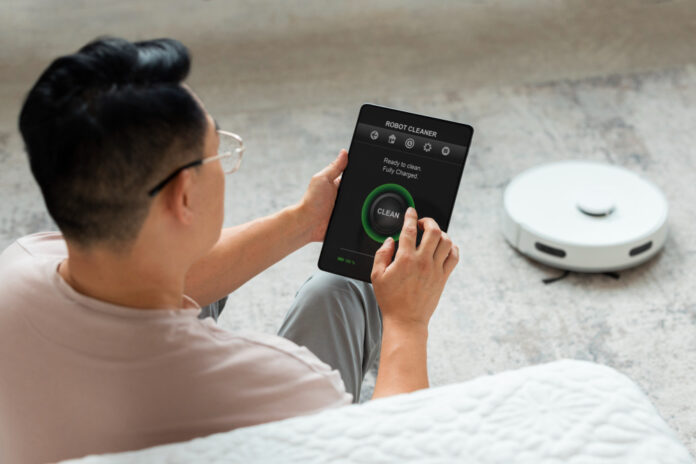Artificial intelligence (AI) is the capacity that humans give to machines to learn from experience and perform basic tasks requiring human-like intelligence. AI includes various subfields, including machine learning, natural language processing, and robotics.
AI has become increasingly dominant in different industries because it can automate tasks, improve efficiency, and make decisions backed by valid and correct data. For example, in home security, AI-powered security systems can analyze video feeds, detect suspicious activities, and send real-time alerts, providing homeowners with enhanced protection and peace of mind.
This article delves into home security and its dynamic integration with cutting-edge AI technology. We will also examine how AI-powered surveillance systems, smart locks, and motion sensors have revolutionized home safety. Furthermore, we’ll shed light on the advanced algorithms and machine-learning models that empower AI to detect and prevent potential threats, offering homeowners unparalleled peace and security.
How AI Is Enhancing Home Security
Traditional home security systems are designed to protect homes from intruders and provide peace of mind to homeowners. These security methods include alarm systems, door and window sensors, motion detectors, and surveillance cameras. These systems rely on wired connections and are often monitored by security companies for quick response to emergencies.
Artificial intelligence has revolutionized traditional home security systems by incorporating intelligent sensors, cameras, predictive analytics, machine-learning algorithms, and voice assistants/intelligent speakers. This revolution has brought significant effectiveness and convenience to home security solutions.
- Intelligent sensors and cameras: These are enabled with artificial intelligent capabilities that allow them to detect and analyze potential threats on the spot. They can differentiate between everyday activities and suspicious behaviour, providing homeowners with instant alerts and notifications. For instance, AI-powered cameras can identify unfamiliar faces or detect unusual movements, triggering alarms or notifying homeowners through their smartphones.
- Predictive analysis: Through analyzing historical data and patterns, AI-enhanced security systems can predict potential security risks and take proactive measures to protect the home. Suppose the system detects a sudden hike in the number of robberies in the area. In that case, it will recommend additional security measures to homeowners.
- Machine algorithms: An algorithm learns from past incidents, adapts to new changes, and, over time, redefines its threat-detection abilities. This ensures the system becomes increasingly accurate and efficient in identifying potential risks and minimizing false alarms.
- Voice assistants and smart speakers: These speakers, integrated into traditional home security systems, provide users with seamless control and monitoring. Homeowners can use voice commands to interact with their security systems, enabling them to arm or disarm the system, check surveillance footage, or receive status updates hands-free.
Some real-life examples of AI-powered home security systems include Nest Secure, Ring Alarm, and SimpliSafe. These systems utilize AI algorithms to detect unusual activities, send alerts to homeowners’ smartphones, and even integrate with voice assistants like Amazon Alexa, Apple’s Siri, or Google Assistant for added convenience. Such systems have demonstrated significant improvements in deterring burglars, enhancing user experience, and providing peace of mind to homeowners.
The Benefits of AI in Home Security
Artificial intelligence has indisputably changed the face of home security, offering numerous benefits for homeowners, including:
- Increased efficiency and accuracy in detecting and preventing break-ins: Advanced algorithms analyze real-time data from various sensors, cameras, and smart devices to identify suspicious activities swiftly. This proactive approach ensures a quick and reliable response, giving homeowners peace of mind and effectively safeguarding their property.
- Better protection against false alarms and other system errors: AI algorithms can analyze data from various sensors, such as motion detectors and cameras, to accurately differentiate between real threats and harmless activities, reducing unnecessary alerts and enhancing overall security.
- Enhanced convenience and ease of use for homeowners: These systems can learn to adapt to the daily routine of homeowners, automatically arming and disarming the security features based on their patterns. This limits the need to input programs manually and allows homeowners to secure their property effortlessly.
- Potential cost savings over time compared to traditional security systems: AI-controlled home security can help you save in the long term compared to traditional security systems. With intelligent monitoring and real-time analysis, homeowners can efficiently utilize resources such as energy and personnel, optimizing their security budget.
The Future of AI in Home Security
The future of AI in home security holds much potential in making further advancements in technology that can significantly enhance the safety and protection of homes and residents. Artificial intelligence has already revolutionized many industries, and its application in home security is no exception.
AI can make a substantial impact through its seamless integration with other smart home devices and systems. Homeowners can create an intelligent and comprehensive security network by connecting AI-powered security systems like smart locks, cameras, and sensors. AI algorithms analyze data from multiple sources in real time, allowing for immediate detection of suspicious activities and prompt response mechanisms.
Furthermore, AI algorithms can continuously learn and adapt to new patterns and behaviours, enabling them to differentiate between normal and abnormal activities within the home environment. This ability to recognize anomalies helps in detecting potential threats or intrusions more accurately, thereby preventing breaches effectively.
As AI advances, it poses a challenge to home security systems regarding privacy concerns. However, installing strong cybersecurity measures to protect personal data and prevent unauthorized access can create a balance between enhanced security and individual privacy, promoting a general acceptance of artificial intelligence in home security.
AI: Enhancing Home Security
Conclusively, artificial intelligence has proven to be vital in improving home security and enhancing individual safety. AI-powered security systems and technologies such as intelligent surveillance systems, predictive algorithms, and facial recognition have entirely changed home security approaches. By leveraging AI, homeowners can now enjoy proactive threat detection, real-time monitoring, and customized security solutions.
We must acknowledge the challenges associated with AI, including privacy concerns and the potential vulnerability of personal information to hackers. Nevertheless, as we advance, artificial intelligence shows a promising future in home security. AI will likely play an increasingly important role in creating safer and smarter homes as technology moves forward.
Author Bio:
 Jessica Coates is a blogger in Toronto. She graduated with honors from the University of British Columbia with a dual degree in Business Administration and Creative Writing. Jessica Coates is a community manager for small businesses across Canada. When not working, she leisurely studies economics, history, law and business solutions.
Jessica Coates is a blogger in Toronto. She graduated with honors from the University of British Columbia with a dual degree in Business Administration and Creative Writing. Jessica Coates is a community manager for small businesses across Canada. When not working, she leisurely studies economics, history, law and business solutions.

